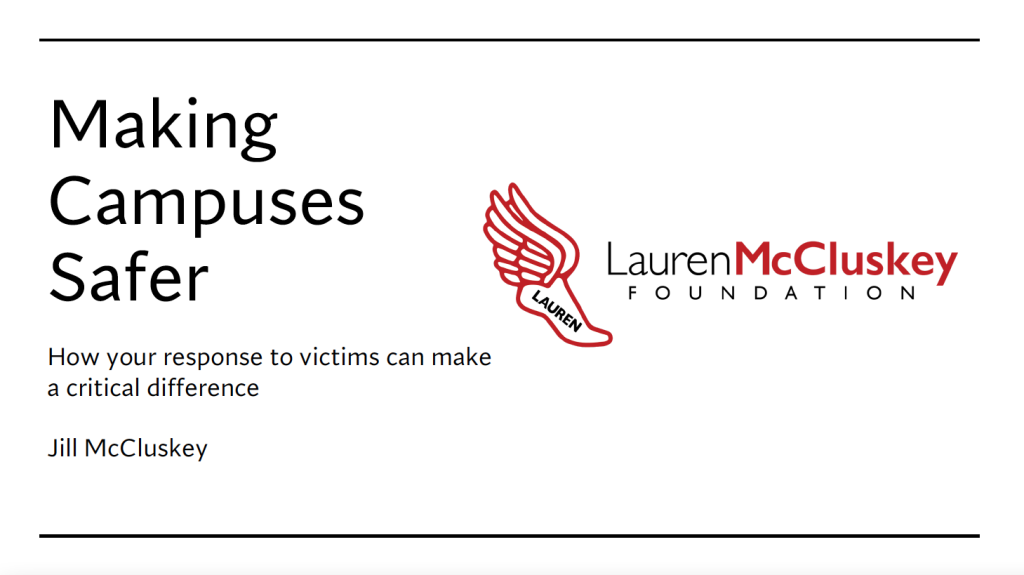For Jill McCluskey, every change the University of Utah makes to increase campus safety and improve how it responds to crime victims helps with her grief.
And so does sharing the story of her daughter, Lauren.

Her hope, McCluskey said in keynote remarks at the first Utah Campus Safety Conference on March 2, is that Lauren and what happened to her will come to mind anytime staff at the U interact with someone seeking help.
And that is how McCluskey began her remarks: painting a portrait of the daughter she lost. Lauren, she said, was an honors student majoring in communication; an accomplished track athlete; a sensitive young woman who cared deeply about animals, was active in her church and, for an internship project, created a photo directory of all the residents in her grandparents’ retirement community.
Lauren also wanted to have a boyfriend, her mother said, and met a “manipulative, conman” who lied to her about his name, his age and his criminal history. Within a month, Lauren had uncovered the deception and broke off the relationship. On the evening of Oct. 22, 2018, the man attacked and killed Lauren as she walked from a class back to her residence hall. Lauren, who was 21, happened to be on the phone with her mother at the time.
The U has acknowledged it failed to respond appropriately when Lauren shared concerns about her safety and reached a $13.5 million settlement with her family, announced on Oct. 22, 2020.
McCluskey praised steps the U has taken to reshape its campus safety operations since her daughter’s death while calling for more change. McCluskey also shared how the foundation she and her husband Matt McCluskey, both professors at Washington State University, created in Lauren’s name is working to address stalking and dating violence.
McCluskey said one of her first thoughts after Lauren’s death was what she would have done if approached by a student in her daughter’s situation. That led to the creation of Lauren’s Promise, a simple statement initially intended for faculty to include on a syllabus to indicate they will listen to and believe a person who reports being threatened or stalked and support changes that improve response to dating and stalking violence.
“We have had at least one professor at over 200 universities who has made this promise and I’ve heard many stories about how it has been effective,” McCluskey said. “It’s making a difference.”
Lauren’s Promise: I will listen and believe you if someone is threatening you.
Watch McCluskey's keynote address
Five strategic priorities
The Lauren McCluskey Foundation’s campus safety work, McCluskey said, includes five strategic priorities: increase awareness of the seriousness of dating violence and stalking; expand adoption of Lauren’s Promise beyond higher education; create a “best practices blueprint” for an effective response to reports of stalking and dating violence; develop a campus safety scorecard that could be adopted nationally; and share resources to strengthen dating violence and stalking laws.
The campus safety scorecard, now in development, would evaluate policies and procedures, training, response coordination, quality of victim services, campus climate, violence prevention programs, etc., McCluskey said. She’d like to see the scorecard incorporated in campus evaluations conducted by U.S. News & World Report.
McCluskey specifically hailed the U’s goal of having women comprise 30% of its peace officer ranks, which she said may make women more likely to report crimes.
But she also noted the communication failures, coordination problems and lack of timely responses that affected her daughter’s case. Lauren’s risk of being harmed also might have been recognized had the U been using the Lethality Assessment Program in 2018, McCluskey said; since then, the U has adopted the protocol, a series of questions used to evaluate the likelihood of being seriously injured or killed by an intimate partner.
McCluskey suggested the U adopt a campus safety bill of rights expressly barring sexual harassment and violence; calling for cases to be documented, investigated, reported and responded to, including by housing staff, in a timely manner.
She also shared the idea of a law enforcement promise that mirrors Lauren’s Promise—a pledge to treat people who report crimes with respect and dignity, to investigate reports with urgency and to offer protection and access to resources. Such a promise might help campus officers overcome distrust from students, she said.
McCluskey said Lauren visited the U’s counseling center twice after her breakup, including on the day she was killed. But the records of those visits are sealed, she said, and the family has been unable to learn what happened in those sessions. McCluskey said services provided by counseling staff deserve the same scrutiny as other campus entities, such as public safety and housing staff, but she said they are currently shielded from accountability that might lead to better practices and “save lives of future victims.”
“We need to listen to victims and be accountable for mistakes,” McCluskey said. “We might make a mistake but be accountable for it and apologize when it’s appropriate. That goes a long way. Then, cherish the whistleblower who raises uncomfortable truths.”

